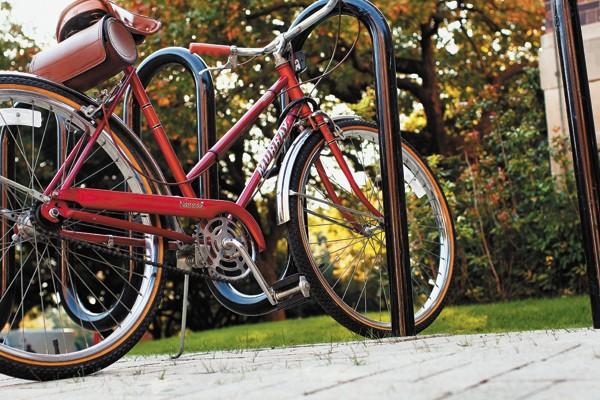
A bicylce rests locked to a bike rack outside of Hughes-Trigg Student Center Tuesday afternoon. CASEY LEE/The Daily Campus
The number of bikes ridden on campus is growing and is expected to continue to grow, as a result of the budding awareness of sustainability.
Michael Paul, executive director of SMU’s Facilities Management and Sustainability has noticed two trends, more bikes when gas prices are up and more bike racks needed. He reports that his organization is continually increasing the bike rack count and there have been several racks added in the past year in front of places like Hughes-Trigg, Umphrey Lee and the Dedman Center for Lifetime Sports. In general, Paul has noticed a “long term increase in bike use because of an awareness of sustainability.”
Paul says it takes less energy to ride a bike and “you can get around a lot faster.” Because Dallas is fairly flat, you don’t get hot and sweaty and it’s not as vigorous as walking in the heat during the summer time, he said. Another important advantage of riding a bike is that parking is getting more restrictive.
“It really is easy to ride a bike on campus. It’s really the way to go,” he said.
The FMS has been making the campus more bike-friendly and is continuing to develop new ideas. The Dedman Center for Lifetime Sports had a donor give $5,000 worth of bikes for a rental program, and the sustainability committee here at SMU is trying to get more funding for it. According to Paul, the rental program immediately developed a waiting list.
“We’d like to grow the rental program that seems to have been pretty successful,” Paul said.
SMU sophomore Tiffany Hoffman explained the campus is pretty small and the living communities are not necessarily far enough to ride a bike. “But living off campus, [a bike] is something people should really consider,” Hoffman said.
SMU police have noticed a trend not only in the number of bikes ridden on campus, but also the number of bike thefts.
SMU police department’s Lt. Enrique Jemmott said one man has been reported for stealing numerous bikes on the SMU campus and Jemmott has arrested him a few times. He explained that it is common for bike thieves to sell the bike to a pawn shop. Once it is at the pawn shop, the police are able to look up the sticker registration number on the bike and return it to its owner if the bike has been registered.
“One of the main things to do is to register [your] bikes…so if it’s stolen, we can recover it,” Jemmott said.
He also said there are certain regulations regarding bikes that most students are unaware of.
“If you look around campus, there’s a bike rack in front of every building,” Jemmott said.
If a bike is locked onto stairs or poles, they can sometimes get in the way of handicapped people trying to get in and out of a building. If the police feel the bike is in the way, they will cut the lock off and the owner can retrieve their bike back from the police station, Jemmott explained.
He said that one major advantage of riding a bike is that you can zip through traffic, and riding a bike can sometimes be faster than driving a car to campus.
Although some students who live on campus don’t ride bikes to class, sophomore Melissa Cam said, “If I lived close to campus, I’d think riding a bike would be more efficient.”








